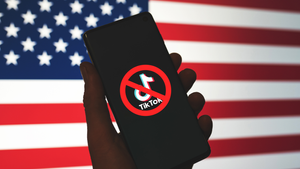When US Congress was first debating the sell-or-be-banned law that orders TikTok’s China-based owner ByteDance to sell the app or face a US-wide ban, sources said that actually divesting the app was a “last resort” option for ByteDance bosses. With that law now passed, sources have told Reuters that selling TikTok has become a “no resort” option.
“The algorithms TikTok relies on for its operations are deemed core to ByteDance's overall operations”, Reuters reports, citing those sources. “TikTok accounts for a small share of ByteDance's total revenues and daily active users, so the parent would rather have the app shut down in the US in a worst case scenario than sell it to a potential American buyer”.
Although the US reportedly accounted for about 25% of TikTok’s revenues last year, TikTok itself is a small part of ByteDance’s wider business. It makes most of its money from the apps it operates in China, including Douyin, the Chinese equivalent of TikTok.
Shutting down TikTok in the US would therefore “have limited impact on ByteDance's business while the company would not have to give up its core algorithm”, Reuters’ sources insist.
Under the final version of the sell-or-be-banned law, ByteDance has 270 days to sell TikTok before any ban goes into effect. If a deal is still being negotiated at that point, the US President can extend the deadline by 90 days. That said, TikTok is still hoping it can scupper the new law in the courts on the basis it breaches constitutional rights to free speech.
When Joe Biden signed off the new law earlier this week, TikTok CEO Shouzi Chew told the app's users in a video post, “Rest assured, we aren’t going anywhere. We are confident and we will keep fighting for your rights in the courts. The facts and the constitution are on our side”.
When the law was being debated in US Congress, its supporters were keen to stress it wasn’t really a TikTok ban, because ByteDance would sell the app and it would then carry on operating. But TikTok’s lobbyists were adamant it was, in fact, a ban, because if the new law can’t be blocked in the courts, access to the video sharing app in the US really will be cut off.
When Donald Trump tried to ban TikTok back when he was President, there was talk of the TikTok US business being spun off and ByteDance retaining ownership in the rest of the world. A key challenge with that option though is splitting up ByteDance’s all important algorithm.
A recent report in The Information suggested ByteDance was looking into the option of selling TikTok US without the algorithm, so the buyer would just get the brand, userbase and basic platform. But ByteDance issued a statement yesterday insisting that wasn’t true.
Many supporters of the law in Washington likely believe ByteDance is still bluffing about allowing a US ban to go into effect, relying on its constitutional arguments in court to at least extend the deadline of any sale, even if they ultimately fail to defeat the law entirely.
However, TikTok has been banned in India since 2020, which is a priority growth market for many of ByteDance’s competitors. This means the Chinese company is used to achieving growth while being absent in some key countries. So maybe ByteDance’s ban bluff isn’t a bluff at all.

